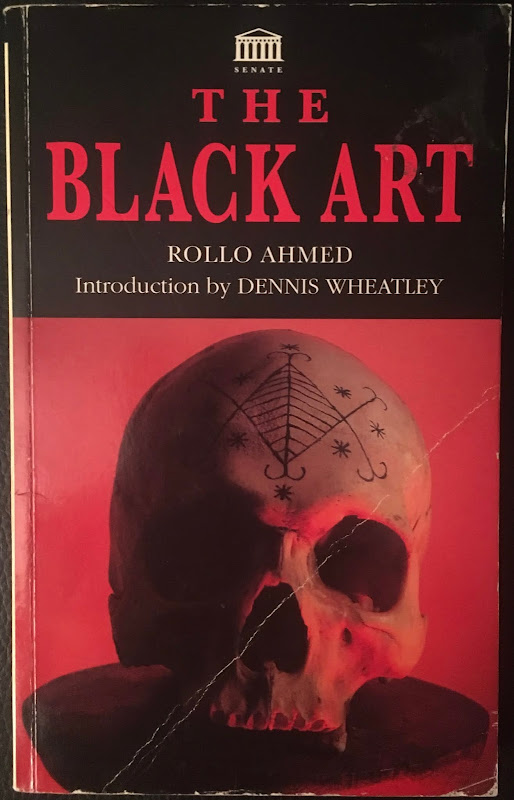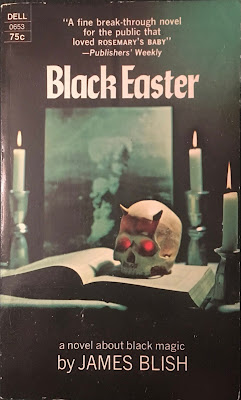Rollo Ahmed: The Black Art
After writing his very successful black magic-themed novel, The Devil Rides Out, Dennis Wheatley was asked by publishers to pen a reference book about the occult and black magic. Wheatley advised that he did not feel he was up to that challenge, at least not at that time. While Wheatley would eventually write such a book, he would not do so for multiple decades, when he published The Devil and All His Works in 1971. However, back in the 1930s, when he was originally approached to write a nonfiction book about the occult, he recommended they go with a man named Rollo Ahmed.
 |
| A more recent paperback edition of The Black Art |
Ahmed was an occultist who had also instructed Wheatley and his wife in some of the basics of yoga (not the modern stretching-in-tight-pants fad that goes by the name of yoga). The result of this was a book called The Black Art, first published in 1936. Wheatley also authored an introduction for the book, which, to my knowledge, has been included in each edition of the book over the years.
 |
| Author photo from the first edition of The Black Art |
As for the contents of the book, Ahmed goes from ancient days to more modern days, covering various forms of worship and the usage by different groups of magic. As with many other similar books, there is a certain level of "take this with a grain of salt" readers should keep in mind. He covers many things that can also be found in various books by Montague Summers, although I would say that Ahmed is more accessible as a writer than Summers, who generally approached such subjects with a rather scholarly view, often quoting from non-English sources in the original languages with no translation offered, clearly assuming all of his readers would be well-versed in about seven or so different languages, such as Latin, French, and German, as well as English, the language in which he wrote his books. This is not something Ahmed did. From my impression of the book (and, to be fair, it has been a number of years since I read it, so I may not remember everything correctly), Ahmed tried to write a book that the average English-speaking reader who has some interest in the topic could pick up and read, while Summers just assumed the presence of a rather aristocratic education on the part of his audience. Regardless, as with any book, it is written by a person and as such, don't let a book like this form your full understanding of the subject or you will likely be assimilating errors and misconceptions along with some flat-out myths into your knowledge base.
 | ||
| First edition of The Black Art, unfortunately without the extremely rare dustjacket |
One could criticize a book such as The Black Art for including arguably more fiction than fact, despite being presented as a nonfiction work. Something to remember is that our understanding and knowledge of the past and various long-extinct societies change over time as different information is uncovered. Part of the issue is separating propaganda from actual history or the eventual discounting of sources such as confessions made by supposed witches under the various creative forms of torture which used to occur. Even the extent of the sadism of the Inquisition itself has been reevaluated over the years due to reviewing what information we have to go off of.
 |
| Issue of Fortean Times which includes the first half of an article about Rollo Ahmed |
It would be remiss of me to not mention the fact that Rollo Ahmed got into a fair amount of legal trouble, as well. Apparently, he was imprisoned on three different occasions for fraud. According to a two-part article on Ahmed's life from Fortean Times, these legal troubles related to his practice of the occult and the misrepresentation of his services. Whether this was intentional on the part of Ahmed (i.e. a man who had a reasonable knowledge of the topic of the occult in general using this to exploit superstitious folks for financial gain) or just a product of a man believing in something that does not actually work isn't clear, but I would imagine that there was likely a bit of opportunism on his part. He advertised his services as an occultist at various times and would purportedly be able to lift curses and other such things, for a nice fee, of course. It seems, that at least sometimes, his services did not seem to have the desired effect.
Ahmed is mostly remembered as something of a footnote in the life of Dennis Wheatley now, it seems. In addition to The Black Art, he also wrote a somewhat autobiographical book, I Rise, but to my knowledge, that was pretty much all of his output as a writer. Although he was not the larger-than-life, never-ending presence in the world of the occult that is Aleister Crowley, Ahmed is still an interesting figure and his book, The Black Art, is an interesting read, as a curiosity from a different time, if nothing else.


Comments
Post a Comment